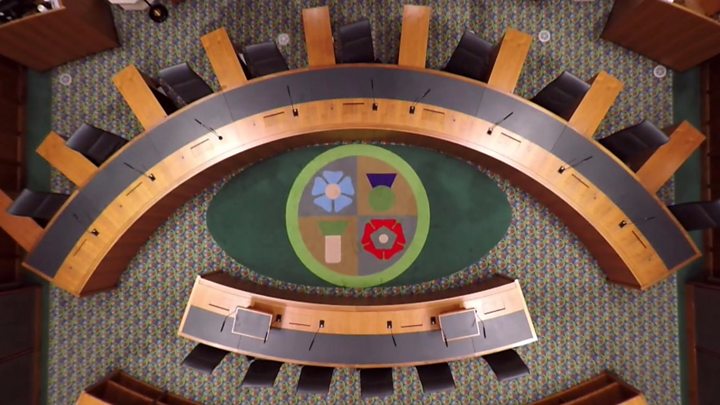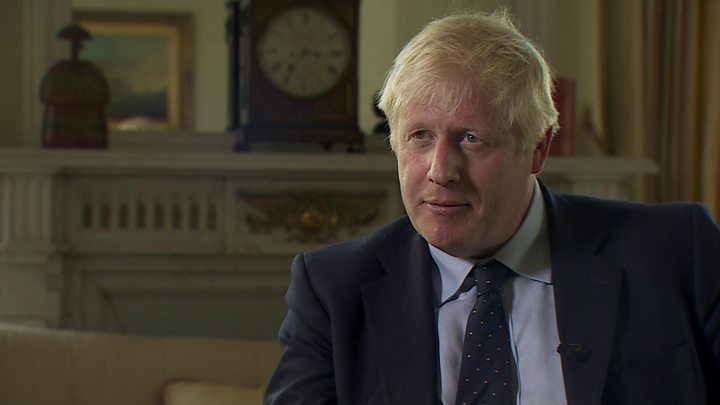The Supreme Court is meeting to consider whether Boris Johnson acted lawfully in suspending Parliament.
The 11 judges are hearing two appeals relating to the PM’s decision to prorogue Parliament to mid-October.
Edinburgh’s Court of Session found last week that the shutdown was unlawful and “of no effect”, but London’s High Court said it was not a court matter.
Lady Hale, the President of the Court, said its job was to “decide serious and difficult questions of law”.
But, in her opening statement, she said the court would not determine “wider political questions” relating to the Brexit process and its ruling would have no bearing on “when and how the UK leaves the EU”.
Ahead of the unprecedented hearing, the prime minister said he would “wait and see what the judges say” before deciding whether to recall Parliament.
- Updates as PM’s suspension of Parliament goes to court
- Could the Supreme Court overrule the government?
- Judges rule Parliament suspension is unlawful
- Johnson’s suspension of Parliament ruled lawful
For the next three days, the Supreme Court in London will hear arguments from the government and campaigners challenging the decision to suspend Parliament.
The suspension, a process known as prorogation, began a week ago.
MPs are not scheduled to return until 14 October, when there will be a Queen’s Speech outlining Mr Johnson’s legislative plans.
Image copyright
PA Media
Top row (from left): Lord Sales, Lady Arden, Lady Black, Lord Kerr, Lord Hodge, Lady Hale. Second row (from left): Lord Kitchin, Lord Lloyd-Jones, Lord Carnwath, Lord Wilson, Lord Reed
Scotland’s highest civil court last week found in favour of a cross-party group of politicians challenging the PM’s move and ruled that Mr Johnson’s suspension of Parliament was unlawful.
The judges were unanimous in finding Mr Johnson was motivated by the “improper purpose of stymieing Parliament”, and he had effectively misled the Queen in advising her to suspend Parliament.
The judgement came after London’s High Court heard a case brought by businesswoman and campaigner Gina Miller, who argued the shutdown of Parliament was “an unlawful abuse of power”.
The judges said they rejected her claim because the suspension of Parliament was a “purely political” move and was therefore “not a matter for the courts”.

The government is now appealing against the ruling in Scotland, while Ms Miller is appealing against London’s High Court judgement.
‘Frustrate policies’
Lord Pannick, the crossbench peer and QC representing Ms Miller, said it was not the court’s responsibility to determine the length of time Parliament should have been suspended, as this was a political matter for the government.
But he said it was “being asked to consider the legal question of whether it is within the scope of the power conferred on the prime minister to exercise it for the purpose alleged”.
The facts, he said, showed the PM had advised the Queen to suspend Parliament for five weeks “because he wishes to avoid what he saw as the risk that Parliament, during that period, would take action to frustrate or damage the policies of his government”.
Image copyright
Getty Images
Gina Miller is appealing against an earlier ruling which found in favour of the government
Image copyright
Getty Images
The court case is expected to last three days
Eleven of the Supreme Court justices – the largest possible panel – will hear legal arguments from the English and Scottish court cases. The government’s lawyers will then respond.
BBC legal affairs correspondent Clive Coleman said it was only the second time 11 justices would sit – the first time this happened was in Ms Miller’s successful challenge as to whether the prime minister or Parliament should trigger Article 50 to start the process for leaving the EU.
He added that they would determine whether prorogation was a matter for the courts.
If they decide it is, they will go on to rule definitively on whether Mr Johnson’s true motive in advising the Queen was to undermine MPs’ ability to legislate and respond to events as the country prepares to leave the EU, our correspondent added.
Opposition parties have called for Parliament to be recalled.
Speaking to BBC political editor Laura Kuenssberg ahead of the start of the court case, Mr Johnson said he had the “greatest respect for the judiciary”, and its independence “is one of the glories of the UK”.
“And I think the best thing I can say, having said that, is to wait and see what they say,” he said.
Asked again if he would be ready to recall Parliament if that was what the Supreme Court said he ought to do, he said: “I think the best thing I could do is wait and see what the judges say.”

On Monday, the prime minister held talks in Luxembourg with EU counterparts and negotiators.
Afterwards, he said the EU had had “a bellyful” of the Brexit process and wanted to get a deal in order to move on to the next phase of talks on future relations.
A UK government source said on Monday the gap the UK and Brussels needed to bridge to achieve a deal on the terms of exit “remains quite large”.
Supreme Court examines lawfulness of Parliament suspension}

